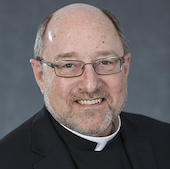
Readings:
Reading 1: Sirach 3:2-6, 12-14
Responsorial Psalm: Psalm 128:1-2, 3, 4-5.
Reading 2: Colossians 3:12-21
Gospel: Luke 2:22-40
When I first arrived in Bogotá, Colombia, at my first assignment as a priest after ordination, I was irritated by all of the forms I had to fill out to obtain my residency permit. I was especially irritated by questions asking about information concerning my parents. “Where did they come from? What profession did they practice? How many other children did they have?” What business is it of the Colombian government? In my individualistic and brash North American way, I thought that my identity has nothing to do with my parents. I am my own person! My accomplishments, my defects, have nothing directly to do with my parents. These questions are inappropriate and intrusive!
Subsequent years of reflection have made me see these questions in an entirely different way. They implicitly affirm that all human beings are who they are — at least in part — because of the people who raised them. Jesus, after all, as a human being, owed much of his identity to his parents. The feast of the Holy Family is an occasion for all of us to reflect on how our parents have protected, nurtured, and formed us. It also encourages us to take seriously that Jesus, in addition to being God, was really a human being — one of us.
This celebration of the Holy Family is a logical connection to Christmas as the feast of the incarnation. Jesus, becoming a human being like us in all things except sin (Heb 4:15), had to be born into a family. Today we are challenged to reflect on the family that Jesus was born into, but also on families in general and our own family in particular. In the course of this reflection questions are raised that get at the heart of both our faith and the deepest part of our own humanity. What does it mean when a new life is welcomed into a family? How is the relationship between a couple changed when their first baby is born and the “job description” of mother and father is added to that of husband and wife? What is the relationship between this nuclear family and the extended families and society to which all three — mother, father, and child — must relate in a new way?
Curiously, we know very little about the details of Jesus and his family life. Some accounts of this early period of his life are found in the Gospels of Luke and Matthew, but taken together, these two witnesses of Jesus’ early life do not agree on some of the details. What they do agree upon is that because of Jesus’ birth into precarious circumstances, both Mary and Joseph see their first obligation as one of nurture and protection. In the Gospel of Matthew, Joseph and Mary flee to Egypt to escape Herod’s murderous scheme to rid himself of competition to the throne (Mt. 2: 1-23). But in our reading today, Luke’s Gospel has Jesus’ parents provide their son with another kind of protection. As pious Jews, on the eighth day after Jesus’ birth, they have him circumcised to fulfill the Law of Moses. They then return forty days later for Mary’s purification and to present Jesus in the Temple, offering the sacrifice prescribed for the poor: “a pair of turtledoves or two young pigeons.”
It is in the Temple that two elderly holy people, Simeon and Anna, see the importance of this otherwise humble child. The parents “are amazed” (Lk. 2: 33) and Simeon tells Mary that Jesus will be a sign of contradiction for many, and that “a sword will pierce her soul, as well.” In following the Law of Moses, in practicing their religious obligations, Mary and Joseph link Jesus with not only his close relatives, but also the wider cultural world. They begin early in Jesus’ life to help him establish an identity based on Jewish observances that undergird his sense of place in the world. As parents are challenged to do, both Mary and Joseph play a crucial role in helping Jesus form his basic identity in concert with a larger community.
The Feast of the Holy Family forces us to reject the heresy of “the self-made individual.” Today we celebrate our dependence on one another, especially on those who raised us, for our very identity.
Rev. Mark Francis, CSV
President, Catholic Theological Union